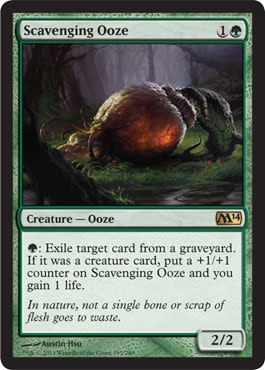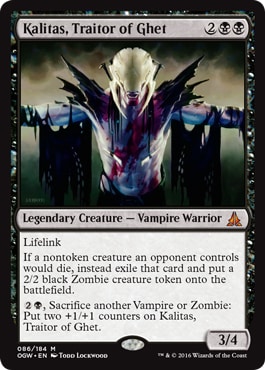This past weekend we had not just one, but a few major Modern events take place. While looking over the results of these events and reading the feedback from people who had also viewed the results, I was reminded of an old XKCD comic that felt relevant:

Something that you will hear Magic players reference a good deal when preparing for events is the "metagame". Generally, metagame refers to the decks you expect to play against at a given event you are showing up to.
In narrow formats like Standard, the metagame can often be predictable which is something good players have a chance to exploit. There are generally a handful of decks that are competitive at any given point and if you can create something that is favorable against four of the five best decks you are able to put yourself into a good position to do well against a majority of the field. This is because these five best decks in Standard will often make up half or more of the field at a major event.
When it comes to a format like Modern, though, it becomes far more difficult to gain an edge in this manner. Modern is easily the most diverse competitive format Magic has ever had. By this I mean that at any given point the collection of "top" decks in Modern is much wider than Standard on average. Even just using this past weekend as an example - looking at the Top 8s from the Open and the Grand Prix that took place, there are 12 unique archetypes that had top finishes.
While 12 might not sound like a lot of decks - keep in mind this is just from a sample of 16 top finishing decks from two events. If we even just double this number of events to looking at the Top 8 from four larger Modern events, we get to 21 decks in my small sample here. This level of variety is not out of the ordinary for Modern. As someone who has been playing the format a good deal for many years now, this is to be expected. Outside of a dark time like Eldrazi Winter, the format is always incredibly varied.
I believe this variety is due to a couple different reasons. The first is related to the power level of the format as a whole. Unlike some non-rotating formats that have cards legal which are far more powerful than others (looking at you, Brainstorm), the power level of Modern tends to be more flat.
What I mean by this is, while there is no doubt in my mind Humans is a bit stronger than other decks in the format, I also firmly believe that it is not so much better that you have to register Humans to be competitive. Modern is a format where the best deck tends to be close in power level to the 10th best deck, which is what creates such a deep pool of cards we can play.
Second is that there is a very real cost associated with changing decks in a format like Modern. This cost is not only monetary, but also costly in terms of time. Learning the ins and outs of a new deck in a format where you will play against so many different things takes a good deal of time. People often repeat the mantra that Modern is a format where you should "play what you know" comes from this time cost.
Even if I think my deck is only the 15th best deck in the format at a given point, there is a very likely chance that my experience with that deck means I will play it at a power level that is higher than I would the "best" deck at an event.
This variety that we can expect at large Modern events is what makes trying to over-metagame foolish. I cannot tell you the number of times I have heard someone say something to the effect of:
"I did not think this deck was very good in general, but it is great against Control! I just never played against any control."
Or
"This deck trashes the best deck(s) in the format, but I only played against garbage which was able to beat me but not the real decks!"
In my opinion, it is never correct at a large Modern event to play a deck based purely on it being favored in a few matches if you expect it to struggle most other places. This is what I would classify as over-metagaming and will result in sadness most of the time. In my experience the better way to approach the format is with smaller changes to your existing deck, rather than starting from scratch with something narrow.
To use the latest metagame change that had people in a fuss as an example - Bridge Vine recently broke onto the scene. I saw a lot of people making extreme changes, even going as far as main decking cards like Surgical Extraction and Leyline of the Void. These narrow cards are great against Bridge Vine, but Bridge Vine is not suddenly 25%, or even 10%, of what you are going to be playing against.
To give an example of what I feel is a proper adjustment to a new graveyard deck, I would like to use the ![]()
![]() Rock deck I have worked on a good deal:
Rock deck I have worked on a good deal:
B/G Rock | Modern | Jeff Hoogland
- Creatures (14)
- 1 Kalitas, Traitor of Ghet
- 1 Tasigur, the Golden Fang
- 4 Scavenging Ooze
- 4 Tarmogoyf
- 4 Tireless Tracker
- Planeswalkers (4)
- 1 Liliana, the Last Hope
- 3 Liliana of the Veil
- Instants (6)
- 2 Abrupt Decay
- 4 Fatal Push
- Sorceries (11)
- 2 Maelstrom Pulse
- 2 Thoughtseize
- 3 Collective Brutality
- 4 Inquisition of Kozilek
Instead of playing narrow cards that target only graveyard decks in the main deck, I have instead simply added more copies of generically powerful cards that also happen to be good against graveyard decks:
This is what I believe to be the proper way to "metagame" in Modern. Do not make strong knee jerk changes to your deck, making it worse against the field, to make it much better against a specific subset of decks. Instead make small changes that allow you to be better against the decks you want to be better against, while still having a cohesive gameplan in general.
Wrapping Up
Keep in mind that what I talk about here in terms of metagaming is intended to apply to large / open field Modern events like Grand Prix, Opens, and even Classics. If you know 20 of the same 30 people show up to your local shop all playing a narrow subset of decks every week - that is something you can properly metagame for.
Expecting hundreds of people showing up to a large Modern event to all be playing the same narrow subset of decks, though, is just setting yourself up for disappointment though.























